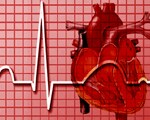Men who consume the recommended amount of vitamin D are somewhat less likely to suffer a heart attack.

Although studies have linked vitamin D deficiency to a higher risk of cardiovascular disease (CVD), evidence regarding whether vitamin D intake from foods or supplements is prospectively associated with lower CVD risk in healthy humans has been inconclusive.
To evaluate the associations between both dietary and supplemental vitamin D and CVD risk, researchers followed 74,272 women and 44,592 men from America, free of CVD and cancer at the start of the study, for almost two decades.
It was found that men who got at least 600 international units (IU) of vitamin D each day - the current recommended amount - were over 15 percent less likely to develop heart problems or a stroke, versus men who got less than 100 IU per day. However, there was no such pattern among women. The findings do not prove that vitamin D, itself, deserves the credit for the lower risks seen in men.
As for vitamin D, the sun is the major natural source, since sunlight triggers vitamin D synthesis in the body. Food sources are relatively few and include fatty fish like salmon and mackerel, and fortified dairy products and cereals.
DoctorNDTV is the one stop site for all your health needs providing the most credible health information, health news and tips with expert advice on healthy living, diet plans, informative videos etc. You can get the most relevant and accurate info you need about health problems like diabetes, cancer, pregnancy, HIV and AIDS, weight loss and many other lifestyle diseases. We have a panel of over 350 experts who help us develop content by giving their valuable inputs and bringing to us the latest in the world of healthcare.












